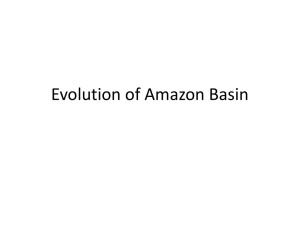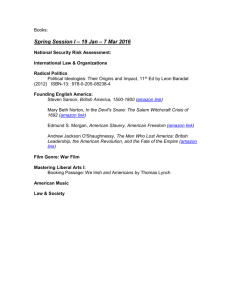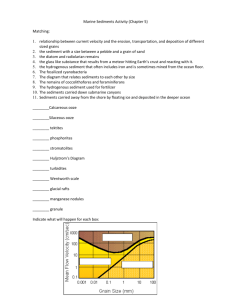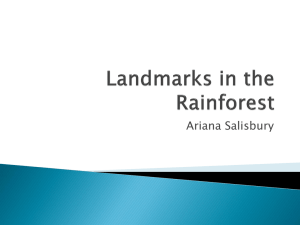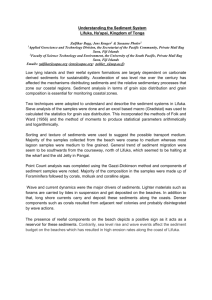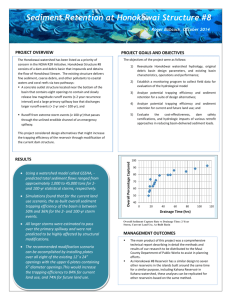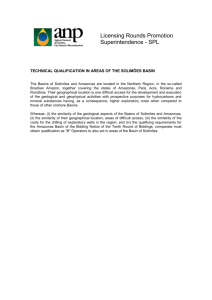229-EOI_CMA_GEF_Act_II.1.3_ENG_FNL
advertisement
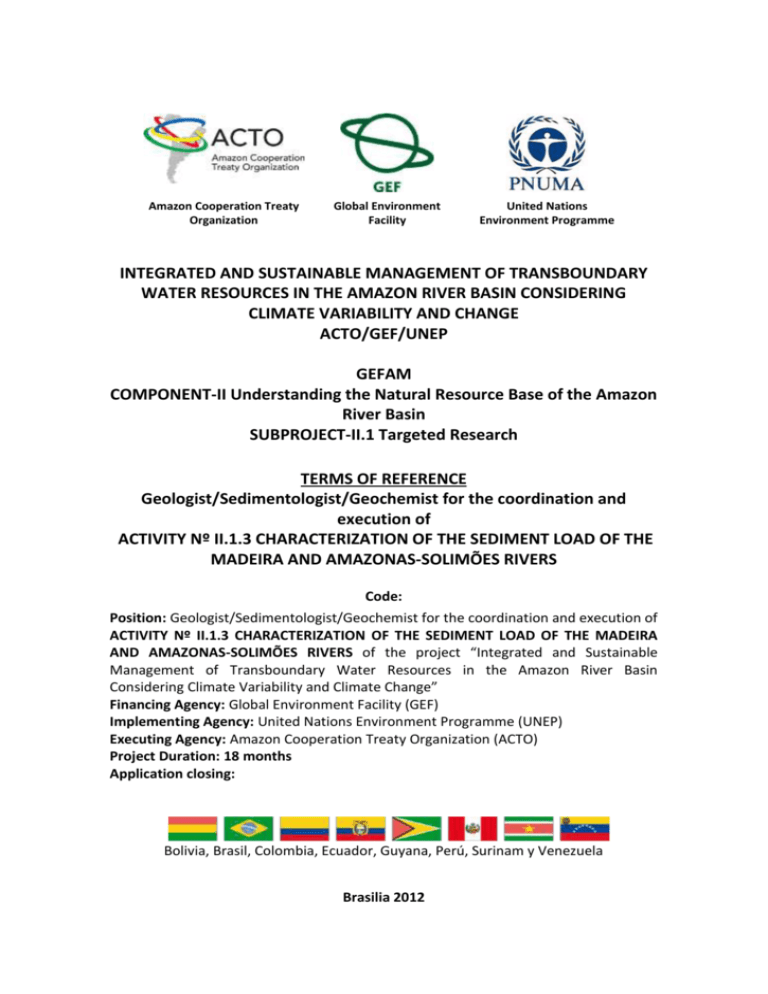
Amazon Cooperation Treaty Organization Global Environment Facility United Nations Environment Programme INTEGRATED AND SUSTAINABLE MANAGEMENT OF TRANSBOUNDARY WATER RESOURCES IN THE AMAZON RIVER BASIN CONSIDERING CLIMATE VARIABILITY AND CHANGE ACTO/GEF/UNEP GEFAM COMPONENT-II Understanding the Natural Resource Base of the Amazon River Basin SUBPROJECT-II.1 Targeted Research TERMS OF REFERENCE Geologist/Sedimentologist/Geochemist for the coordination and execution of ACTIVITY Nº II.1.3 CHARACTERIZATION OF THE SEDIMENT LOAD OF THE MADEIRA AND AMAZONAS-SOLIMÕES RIVERS Code: Position: Geologist/Sedimentologist/Geochemist for the coordination and execution of ACTIVITY Nº II.1.3 CHARACTERIZATION OF THE SEDIMENT LOAD OF THE MADEIRA AND AMAZONAS-SOLIMÕES RIVERS of the project “Integrated and Sustainable Management of Transboundary Water Resources in the Amazon River Basin Considering Climate Variability and Climate Change” Financing Agency: Global Environment Facility (GEF) Implementing Agency: United Nations Environment Programme (UNEP) Executing Agency: Amazon Cooperation Treaty Organization (ACTO) Project Duration: 18 months Application closing: Bolivia, Brasil, Colombia, Ecuador, Guyana, Perú, Surinam y Venezuela Brasilia 2012 I - INTRODUCTION: PROJECT BACKGROUND In recognition of the hydrographical unity of the Amazon Basin and in order to address the need for coordinated action, the Basin countries signed the Amazon Cooperation Treaty (Bolivia, Brazil, Colombia, Ecuador, Guyana, Peru, Suriname, and Venezuela) creating the Amazon Cooperation Treaty Organization (ACTO). In 2003, following an initiative introduced by the Brazilian National Water Agency, and based on the results of a meeting of national focal points of the Inter-American Water Resources Network, ACTO, on behalf of the Amazon Basin countries, and in collaboration with the Organization of American States, sought the support of the GEF to help develop a project proposal aimed at strengthening the institutional framework to effectively initiate integrated water resources management within the world’s largest hydrographic basin, in the context of climate variability and change. The project “Integrated and Sustainable Management of Transboundary Water Resources in the Amazon River Basin Considering Climate Variability and Change” (ACTO/GEF/UNEP) seeks to strengthen the institutional framework to effectively initiate integrated water resources management within the world’s largest hydrographic basin, through planning and executing coordinated activities for the protection and sustainable management of the land and water resources of the Amazon River Basin, in the context of climate variability and change. The project will employ an innovative participatory mechanism as the basis for understanding current and expected IWRM challenges and issues. Such an understanding is the foundation upon which a sustainable and responsive Strategic Action Program (SAP), comprising program of capacity building, institutional strengthening, application of feasible economic instruments, and meaningful social and economic advancement, can be developed. The Amazon River transports about 1,200 x 106 tons of sediment from the South American to the Atlantic Ocean. The discharge and sediment supply into the Amazon River naturally show considerable fluctuation in their delivery rates because of geological and gradient variation in the Basin. Superimposed upon this natural background are human activities which modify the forest cover, expose friable soils to erosion, and encourage altered runoff patterns that exacerbate the natural levels of soil loss in the drainage area. In this context, many attempts have been made to understand the dynamics of the complex biogeochemical processes taking place in the Amazon Basin. The present activity focuses on the determination of the origins of the increasing load of transported sediments due to recent intensive land use in the State of Rondonia. Madeira and Solimões Rivers were chosen because of their environmental and socioeconomic importance. The Madeira River Sub-basin has a catchment area of 1,485,128 km2—or one-quarter of the Amazon Basin, but transports around 400 x 106 tons/year of sediments—or about one-third of the sediment load—to the Amazon River. Confronting the Amazon Basin region are numerous challenges to the sustainable utilization of land and water resources as the region experiences exponential socio- economic growth and internal migratory flows and immigration. The complexity of the issues, coupled with a rapid rate of change in an environment requires the implementation of a process that will help minimize risks associated with deforestation, climate variability and change, and conflicts regarding the use of water and natural resources, while creating a strong foundation upon which to build a Strategic Action Program (SAP) that will address transboundary water resources management concerns shared by Basin countries. The Project has been structured in 5 Components. Component I - Understanding the Amazonian Society focuses on the needs, goals and interests of Basin stakeholders and on the institutions tasked with IWRM and the governance of the Amazon region. This component identifies gaps in knowledge that need to be bridged in order that Amazonian society is brought closer to the sustainable utilization of the natural resources. The focus of this component is water resources that support human activities. The shared vision developed through Component I will inform numerous elements of Component III, which focus on response strategies. Component II focuses on data gathering and analysis and through scientific assessments and data synthesis defines the ability of the natural system to support human activities. Together, Component I and Component II create the basis for strategic interventions (Component III) that will link the human activities and the natural resource base. The outputs of these components will be used in the formulation of the Strategic Action Program (SAP). Component III develops a portfolio of strategies for specific actions, together with financial mechanisms to support and sustain these actions, a related education strategy, communications strategy, multi-stakeholder participation plan (MSPP) and financial strategy. Components IV and V support the management and the M&E system necessary for successful project implementation. Each of the Components is further sub-divided in Subprojects and Activities. II – OBJECTIVES, RESPONSABILITIES AND QUALIFICATION OF THE CONSULTANCY The consultant will coordinate and execute ACTIVITY: II.1.3 CHARACTERIZATION OF THE SEDIMENT LOAD OF THE MADEIRA AND AMAZONAS-SOLIMÕES RIVERS which is part of SUBPROJECT-II.1 Targeted Research and COMPONENT-II Understanding the Natural Resource Base of the Amazon River Basin GENERAL OBJECTIVE Assess the sediment geochemical composition and identify the main sources of anthropogenic-derived suspended and deposited sediments within the principle tributaries of the Amazon River in order to define mitigation actions to reduce the human-driven portion of the erosion process and moderate the increasing mass of sediment inputs into the Madeira-Solimões River System. SPECIFIC OBJECTIVES Design a sediment sampling program in the Madeira and Solimões River Basins; Carry out the sampling campaign, including collecting water samples, samples of suspended sediments, and samples of the riverbed sediments at the river floor; Preserve samples in accordance with standard methods of sediment and water analysis; Perform laboratory analysis of collected samples. Prepare a report on the sedimentation characterization of the Madeira and Solimões River systems and remedial measures SPECIFIC ACTIVITIES 1. Design of a sampling program to support the collection and analysis of sediment and water samples within the principle tributaries of the Amazon River. Plan the activities for the sampling campaign; Select sampling sites; 2. Execution of the sampling campaign in the field Collect samples, during the dry and rainy seasons, including water samples, samples of suspended sediments, and samples of the riverbed sediments at the river floor; Document the sampling campaign; Preserve samples in accordance with standard methods of sediment and water analysis and deliver for laboratory analysis; 3. Execution of laboratory analysis of collected samples Perform laboratory analysis of collected samples, including (i) sedimentological analysis, (ii) geochemical analysis of the sediments, and (iii) water analysis—utilizing standard analytical methodologies. 4. Assessment/characterization of the sediment in the Madeira and Solimões River systems Prepare a report on the sedimentation characterization of the Madeira and Solimões River systems + sedimentation rates Identify the main sources of anthropogenic-derived suspended and deposited sediments within the principle tributaries of the Amazon River Define mitigation actions to reduce the human-driven portion of the erosion process and moderate the increasing mass of sediment inputs into the Madeira-Solimões River System. OUTPUTS, REPORTING AND PAYMENT SCHEDULE All payments to be disbursed according to agreed consultancy fees and after the corresponding output/product has been revised and approved by the Regional Technical Coordinator and the Coordination for Environment and the Executive Direction of the PS/ACTO. The Consultant will be responsible for the delivery of the following outputs: Output 1: Presentation of a strategic plan for project implementation, including detailed methodology of work and the detailed index of the final report (output 5) (1st payment - 10%). Output 2: Detailed Travel plan for the execution of the sampling campaign (2. Payment (advance) - according to the budget of the travel plan) Output 3: Documented Report on the execution of the sampling campaign (3rd payment – 25%). Output 4: Documented planning and methodology for the laboratory analysis (4 th payment – 15%) Output 5: Final Report: Documented analytical results and complete assessment (characterization – human induced sedimentation rate – remedial action) from the completed water and sediment sampling program conducted in the Madeira and Solimões Rivers (4th payment – 50%) METHODOLOGY The sampling program will be carried out during the rainy season (October to April) and during the dry season (May to September). Sampling sites (with a total of 150 samples/year including triplicates) will be selected according to the available information about regional geology and the processes that influence the existing sediment distribution. The sampling sites will be distributed as follows: Ten points on the Madeira River, with five points before and five points after its confluence with the Solimões River; Ten points on the Solimões River, with five points before and five points after its confluence with the Negro River; and, Five points along the confluence of the Negro River with the Solimões River. The samples will include: Water, Suspended sediment, Sediments at the river floor. Laboratory Sample Analysis. The collected samples will be subjected to: (i) field sample analysis, (ii) geochemical analysis, and (iii) water analysis—utilizing standard analytical methodologies. Detailed analytical requirements are available in the full size project of Activity Nº II.1.3 Characterization of the Sediment Load of the Madeira and Amazonas-Solimões Rivers All activities will be executed in permanent coordination with the Activity Coordinator and the Project Regional Technical Coordinator and the Executing Agency-ACTO as well as the National Project Units (NPUs), which will serve as inter-institutional mechanisms to coordinate country-based interventions, education and management activities, in each one of the countries. TRAVEL The Consultancy will involve travel to the ACTO member countries. The coordination travel directly related to the Consultant’s activities will be sponsored/ or reimbursed by the GEFAM Project Coordination Unit (PCU) upon prior approval of travel plan and travel report. III – QUALIFICATIONS Eligibility Criteria and Technical Competencies Education Advanced university degree (PhD level) in Geology, Sedimentology or Geochemistry Experience Demonstrated experience in sediment flow studies. Knowledge and professional experience in hydrological monitoring in the Amazon Basin and water flow measurement with Doppler technology. A minimum of 8 years professional experience in the Amazon Basin. Participation in national and international research projects related to the issues of the project. Excellent communication skills in Portuguese and working knowledge of English or Spanish. Work experience with multi-disciplinary and/or cross-sector teams; Work experience in one or more of the participating countries and/or the Amazon region is an asset; Spanish, Portuguese, Dutch and English are the working languages of the participating countries; Proficiency in Portuguese, and working knowledge of English or Spanish is required (oral and written); Core Competencies Results Orientation: Ability to meet project goals and produce high-quality results. Planning and Execution: Capacity to translate strategic goals and priorities into realistic project deliverables. Leadership: Competent leadership abilities necessary for dynamic, diverse and complex projects. Building Coalitions: Ability to build relevant coalitions to achieve project goals. Strategic Thinking: Ability to formulate objectives, set priorities and implement plans consistent with project interests. IV – ADDITIONAL INFORMATION: Applicant should be available to begin work no later than May 2012 Applicant must be willing and able to travel as needed Consultancy duration: 18 month Total Consultancy fees: U$ 16.000 Proper work documentation required V – SUBMISSION OF APPLICATION Candidates should submit an application package, including a CV in English (no more than 2 pages), Motivation Letter in Spanish or Portuguese (2 pages) and a minimum of two professional references by email to: selecao@otca.org.br The subject of the e-mail message should refer to: GEF-AMAZON Selection/ Activity …….. Application closing day: July 7th, 2012, 18:00 Brasilia local time Contact: SP/OTCA - GEFAM SHIS - QI 05, Conjunto 16, Casa 21 Lago Sul - Brasília DF - Brazil Telephone (55-61) 3248 4119 / 4132 Fax (55-61) 3248 4238 www.otca.org.br
